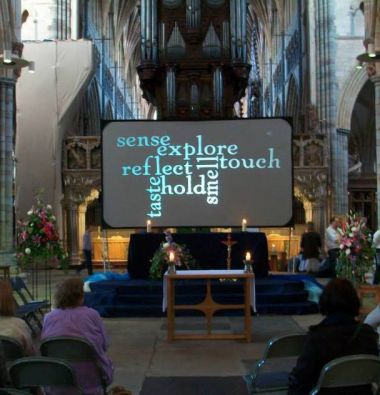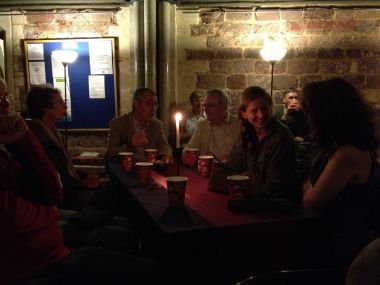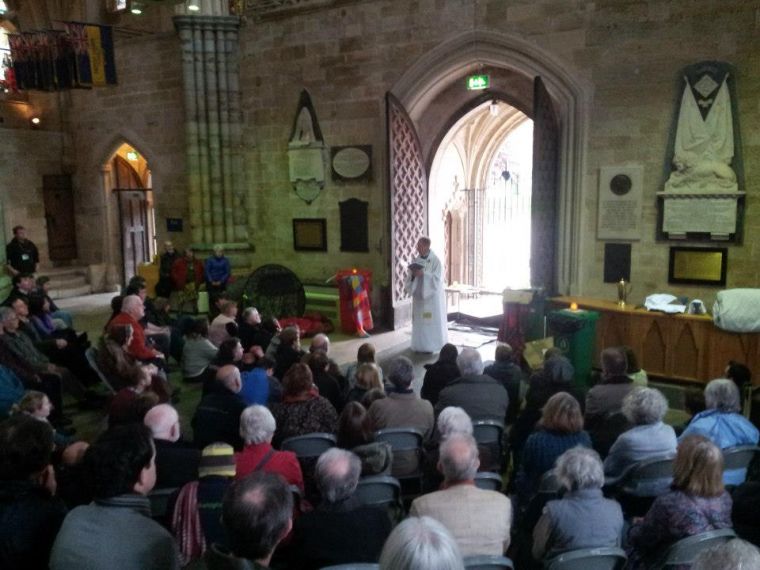Cathedral mission: Reaching the churched, de-churched and unchurched

Anna Norman-Walker leads a dedicated team of volunteers at Exeter Cathedral in creating a space "for anyone who is interested in engaging with Christian spirituality in a contemplative and creative way and who perhaps find traditional models of church a little inaccessible".
It's called Holy Ground, a fresh expression of church that meets on the second Sunday of every month, offering a time of liturgical worship, a cafe space - sometimes with a guest speaker or a Q&A - and a time for contemplative prayer, though the format is fluid and those taking part are encouraged to join in with whichever parts they feel comfortable.
Holy Ground is the subject of a study by the Church Army's Research Unit in which research director George Lings spent some time at fresh expression last year, learning their story and investigating the cathedral's position in reaching out to the community in Exeter.
Specifically, he was looking at the question of "How can we build community and not just put on meetings?"
His report concluding that Holy Ground is "a congregation of the cathedral providing uniquely what a cathedral can do".
Anna, a diocesan missioner, agrees: "Exeter Cathedral is here in the middle of the city. This is a vessel that can hold all sorts of different things, and I think that's what cathedrals can uniquely do. I think cathedrals can be something that a parish or independent church would find quite hard.
"I think cathedrals can be at their best a great space to showcase the life of the wider church. It can be a great place for signposting."
Holy Ground has a wide demographic, with members ranging from teenagers to those in their nineties - it obviously has wide scope for appeal. It is different from other fresh expressions in that about a third of its members are those who actually attend local churches but find the creativity of Holy Ground refreshing. A third are 'de-churched' – those who no longer attend a regular service, and another third are those who are merely curious about faith and want to find out more.
It's an unusually fluid gathering for a traditional cathedral setting, and that's the idea, Anna explains.
"We're not trying to build up a church, we're trying to create a space for people to experience church.

"We have found that occasionally we have people who do want to go a bit deeper, because of course that's the big question that George Ling is asking: where do we do discipleship, and for me that is the big question, but we take it on a fairly ad hoc, case by case basis."
The wide range of 'Holy Grounders', as they call themselves, must make it difficult to work out how best to structure gatherings so as to meet everyone's needs? Anna is quick to challenge that assumption: "I don't think we set out at the beginning and said: 'right, how are we going to cater for committed Christians, de-churched people and un-churched people, because we've got to have something for everyone'.
"In an open handed way we offer a creative act of worship, a cafe conversation, generous hospitality, we don't impose any kind of membership.
"The critics would say 'that's not really church is it?', but I think we have to create pathways into faith in all sorts of ways across the Church, and I think Holy Ground and the cathedral can offer something of that."
Anna is keen that the cathedral uses its position as a pillar of British religious history to engage with the local community.
"Other places don't have the longest piece of vaulted roofing in Europe, and they haven't got amazing pillars and unbelievable stained glass and the most fabulous acoustic, and when you go into a cathedral you immediately sense something of the stillness and the sacredness and the thousand year history.
"There's a thousand years of prayers in the walls. People's stories have been held here through generations and there's such a fabulous space to use. And then to blend that with some use of contemporary technology, to blend the ancient with the future, there's something really exciting about that."
Anna praised the work of other churches in Exeter, many of which offer charismatic, evangelical styles of worship, but she notes that it doesn't suit everyone, which is why Holy Ground focuses on a more liturgical style.
"I don't think that the Church is very good at drawing in people into more liturgical worship, which is why that's an aging group of people," she says.
"And yet what we're seeing is some young people who really like it, and find it to be helpful, and connect with it far better than they do with modern contemporary worship songs."

For Anna, it's about creating a diversity of ways into the Christian story.
"We're all singing about the same Jesus and saying prayers to the same God and the same Spirit, but just as some people like ska music and others like heavy rock, some people do candles and contemplation, stillness and beauty and are much more multi-sensory, while others are much more intuitive and like music that they can relate to.
"I think that's a theological thing; we have a God who is transcendent, who's 'other', who's awesome, who's indescribable, and we have a God in Christ who comes near and is a close and intimate friend. I think if you look at the different expressions of worship, they help people to connect to the face of God that they most relate to.
"The contemporary, charismatic evangelical acts of worship make real sense of 'Jesus is my friend, he's beside me and he meets me on my turf, on my ground, in my space' and for some people that's the point of connection. But for other people the beauty, the awesome, the stillness, the mystery and the magnitude help them to connect. We all have different connecting points."
Holy Ground attracts between 100 to 150 visitors each month, and the team are looking forward to the future as they hope to engage with more people and encourage them to seek God in new ways.
"It feels like we've added to Exeter's menu of worship and learning options: something new, and something that complements but doesn't compete," Anna concludes.
The next meeting will be on 9 March, for more information click here, or email Anna at missioner@exeter.anglican.org











